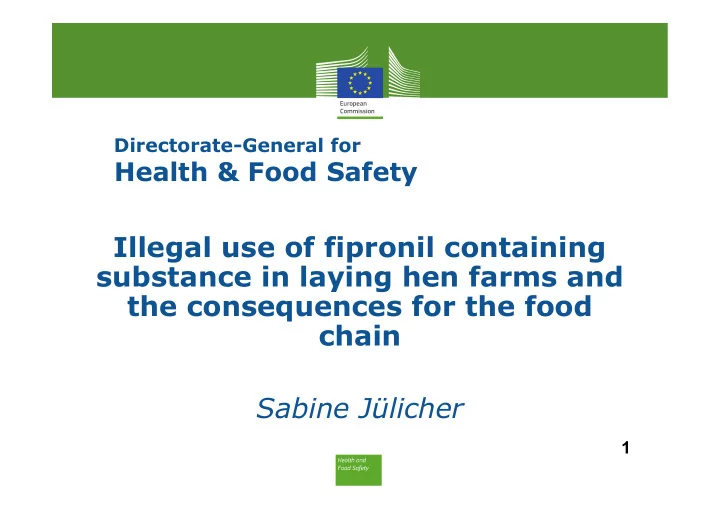

Directorate-General for Health & Food Safety Illegal use of fipronil containing substance in laying hen farms and the consequences for the food chain Sabine Jülicher 1
The contamination incident and current situation • Current situation in Member States with farms blocked • BE, NL, DE, FR • IT and HU • Other Member States • Measures as regards illegally treated farms and eggs /chicken meat (from end of life laying hens) produced on these farms • Fattening chickens /broiler farms not affected by the incident
The contamination incident and current situation • Possible risks for public health are considered to be low - MRL: 0,005 mg/kg (lower limit of analytical determination) - Adverse acute health risk related value: for eggs 0,72 mg/kg and for chicken meat 0,77 mg/kg • Illegal treatment with unauthorised substances other than fipronil (such as amitraz)
Commission services actions in view of harmonised approach In view of a high level of human health protection and to ensure a co-ordinated approach amongst Member States, the Commission services have put forward, via the RASFF, measures to be taken • On 31 July 2017, information on applicable maximum residue levels, measures to be taken as regards illegally treated farms . 4
Commission services actions in view of harmonised approach • On 7 August 2017 , all Member States are to be vigilant as regards the products used for the control of red mite in poultry establishments to ensure that no treatments with unauthorised substances take place. • On 7 August 2017 , a proportionate approach providing a high level of human health protection as regards processed composite products. 5
Commission services actions in view of harmonised approach • On 16 August 2017 , a reminder was sent that all distribution of contaminated eggs/egg products/chicken meat has to be timely notified to RASFF in order to ensure a timely notification to the competent authorities of the country of destination (Member States and third countries) 6
Commission services actions in view of harmonised approach • In addition, yesterday on 30 August an extra- ordinary meeting of the Standing Committee on Plants Animals Food and Feed has been organised to discuss • the current situation • the further management of the incident in particular as regards processing factors to be applied for egg products and the approach as regards processed composite products . 7
Commission services actions in view of harmonised approach • A co-ordination of an EU-wide monitoring on the presence of possibly illegally used substances in eggs and poultry meat (from end-of-life laying hens). Details of that co- ordinated EU-wide monitoring to be finalised within the coming weeks. • A harmonised approach for the disposal of fipronil contaminated animal by-products (eggs, carcasses, feathers, manure, non- compliant food). 8
Commission services actions in view of harmonised approach • The Joint Research Centre shall organise on short notice a proficiency test for official control laboratories for the analysis of fipronil in eggs, egg products and chicken meat. • Furthermore it is foreseen that Directorate F organises late September/early October fact finding missions in the most concerned Member States to gather information in view of future follow-up to this incident. 9
International aspects The Commission has sent an information note to third countries on 10 August (which will be updated if there are significant developments). a) Restrictive measures applied by third countries (situation 30/08/2017) • Ukraine has established an import ban of eggs, egg products and poultry meat from Belgium, Netherlands, Germany and France as from 21 August • Oman has an import ban for eggs from the EU 10
International aspects • Hong Kong has put in place a systematic testing of eggs from EU for the presence of fipronil. • Brazil has prohibited the import of egg products from one establishment in Belgium and one establishment in Netherlands • Kurdistan has prohibited the import of eggs from Belgium Netherlands and Germany. • Several Third Countries, such as USA, Brazil, Japan, Malaysia, Russia have put forward questions or requested more detailed information, which has been provided and no restrictive measures have been (yet) put in place by these countries 11
International aspects b) Findings of illegal use of fipronil in laying hen farms in Third countries Following the findings in EU controls have been performed on the possible illegal use of fipronil in laying hen farms in South Korea and Taiwan. Illegal use of fipronil and other unauthorised substances have been observed in several farms in these countries . Also China has announced on 25 August to control the possible illegal use of fipronil on domestic laying hen farms. 12
Interaction between the RASFF, AAC and the AAC-Food Fraud (AAC-FF) • On 6 July 2017, Belgium initiated a "normal case" through a request for information to The Netherlands in the Administrative Assistance and Cooperation System (AAC). This system allows Member States to liaise bilaterally (or multilaterally) to rapidly confirm suspected cases of fraud. Belgium initiated a "normal case" through a request addressed to another Member State, meaning that the Commission was not an addressee of the notification. 13
Interaction between the RASFF, AAC and the AAC-Food Fraud (AAC-FF) • This system should not be confused with the Rapid Alert System for Food and Feed (RASFF). The Rapid Alert System is a key tool to ensure the cross-border flow of information to swiftly react when risks to public health are detected in the food chain. The Commission task is to verify the RASFF notifications and informing third countries. The Regulation introduces exact deadlines for Member States (48 hours) as well as the Commission (24 hours) for transmitting alert notifications. • The Commission became aware of the eggs contaminated with fipronil on 20 July when the Belgian authorities informed all other Member States through the Rapid Alert System 14
Thank you for your attention ! 15
Recommend
More recommend